
This interview is part of our interview series, where we curate stories of regular people that decided to design a life they love. (click here to learn more).
Marcia & Ray
Some links to the products mentioned below are affiliate links, meaning that if you click and purchase any of them, Nomad Numbers may a commission at no additional cost to you. For more information please review our disclaimer page.
I connected with Marcia through our Facebook community and felt that her early retirement story would be worth sharing with our readers. What I like about Marcia is that unlike our previous guests, she isn’t a blogger, which can make her more relatable to most people reading our blog.
Marcia and her husband Ray are both from Vancouver, Canada. They retired from their jobs in January 2018, at ages 49 and 51 respectively. Two weeks after their last day of work, they packed their bags and flew to Thailand, to spend the next 10 months traveling throughout Asia. They explored different parts of Thailand, Bali, Singapore, Malaysia, Laos, Cambodia, Vietnam, and Japan, before returning back to Vancouver to spend the Christmas holidays. In 2019 they returned to Thailand for the first 2½ months (yup, they love it there) of the year but then decided to take a different approach and visit parts of Europe for the remainder of the year. So far, they’ve hit up France, Italy, Cyprus, and Portugal and before the year is up, will also go to Spain and return to different cities in Italy and France before heading home in December.
Marcia had her wake-up call when she and her husband realized that with the potential proceeds of the sale of their condo, they could retire immediately, rather than waiting until at least 55. And by being nomadic, their annual cost of living would decrease dramatically, since living in Vancouver is so expensive.
Let’s hear from Marcia & Ray!
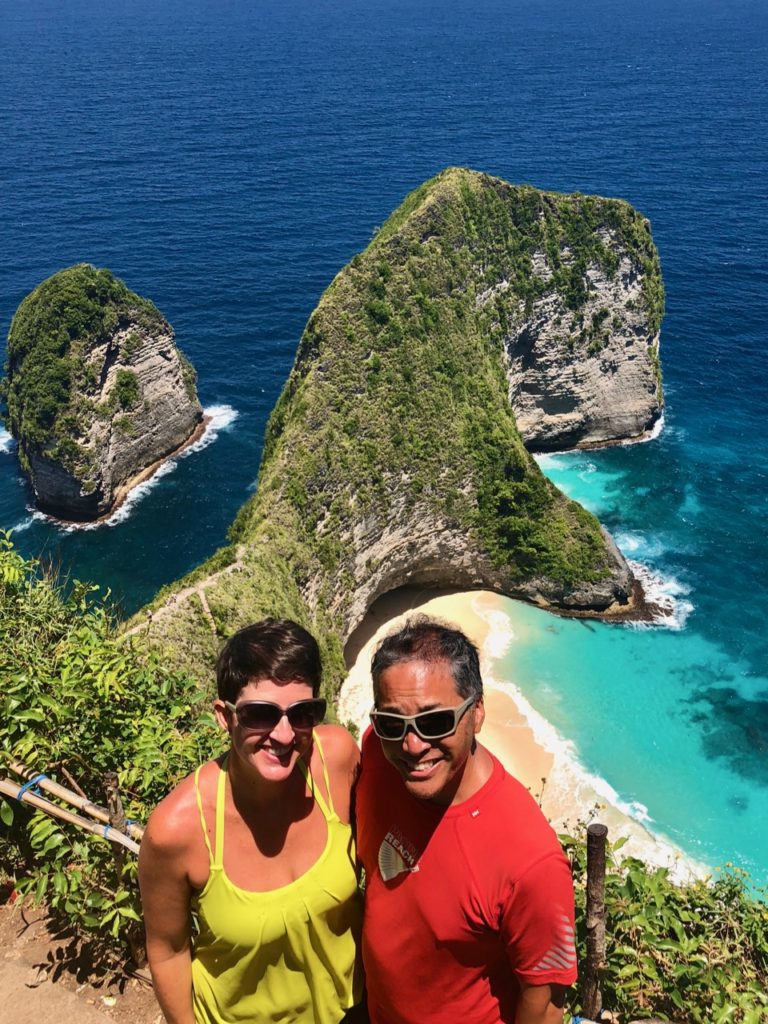
Lifestyle change
What does a typical day in your life look like for you today? And how does it differ from your lifestyle before?
Marcia & Ray (M&R): For us, our lifestyle is obviously very different from before retirement since we started travelling/living abroad for a couple of weeks after our last day of work. And a typical day abroad would certainly differ from how we would spend our time at home if we weren’t travelling. However, one aspect that is different is that we now get to sleep in as late as we’d like (and we do sleep in, usually waking up between 9:00-10:00!), without having to wake up to an annoying alarm clock. It’s lovely.
Depending on where we are and how long we stay in the same place, as well as what there is to see and do in a particular city, we might spend the day taking in one or two sights, going to the gym, reading, or just being online. If we’re someplace for at least a couple of weeks or more, we do try and get to the gym on a regular basis, as long as it’s not too expensive. There have also been a few days where I haven’t got out of my PJs. We even binge-watched the entire series of Game Of Thrones (GOT) just before the start of the final (and disappointing) season.
One downside to our current lifestyle is that we’re limited in what we can do when staying in Airbnbs. For example, I enjoy cooking and baking but none of the places we have stayed at offer the opportunity to do this; in SE Asia, it’s rare to find a place with an oven, so baking is out of the question there. As well, usually places are equipped with the minimum for cookware and rarely have cookie sheets or cake pans, nor do they have any of the more common ingredients I would need to prepare food. Going out and purchasing the ingredients, some of which would be challenging to find in a foreign country, would also prove to be expensive. So this boils down to the fact that we eat out a lot! In fact, we generally eat out for one meal a day and prepare other meals (we typically only eat twice a day) at the apartment.
Because we wake up so late, we usually don’t go to bed until 1:00am or 2:00am, after having watched some Netflix or a movie. Apart from GOT, we’ve watched the entire series of Lost, Stranger Things, Fleabag, Broadchurch, and others over the past 1½ years.
How did your daily agenda change since you step away from your 9-5? What would you say is now the key factor driving the choice you are making daily? How has this change from before?
Check out the infographic below to contrast how Marcia’s priorities have changed before and after their nomadic shift.

What led you to decide to change your lifestyle?
M&R: There were a couple of steps that led us to early retirement. We’ve always hated waking up early (and by early, I mean 6:45am so really, it wasn’t too bad when compared to some others!) to go to work and often lived for the weekends or holidays. While I loved my job of 20+ years, as well as the people I worked with, both my husband and I were ready to not be working. We had previously spoken about taking early retirement at 55 years of age, and after reading the Mr. Money Mustache blog, I began to think more seriously about how to make it happen.
The main impetus for us to make that leap to really early retirement, though, came from the realization that if we sold our condo in downtown Vancouver, which had almost doubled in value since we had purchased it four years previously, we would have enough capital so that we wouldn’t have to work. Ever. We met with our financial advisor and reviewed all the numbers and his software program assured us that it was indeed possible! So six months after selling our apartment, we worked our final day; since then, we’ve been traveling through parts of Asia and Europe and loving it.
M&R: Early retirement for us meant having the freedom – within certain financial constraints, of course – to do what we wanted, when we wanted. A big part of that was being able to travel extensively and explore countries at a more in-depth level.
After almost two years of traveling, I would say that this experience has exceeded my expectations. While we’ve come to realize that traveling frequently from city-to-city (ie. only staying in each city for a few days before moving on) is a bit too tiring for us, our traveling has provided us with different experiences that we could have planned for if we had been on vacation for a limited period of time. Being able to take three months to explore much of Japan was a definite highlight for us, as was getting off the beaten path in Vietnam and discovering the beauty and nature of the Ninh Binh (highly recommended!). This year, we spent a month discovering Paris, something we never could have done if we had been working.
What lifestyle adjustment(s) did you have to make to reach early retirement? What were some of the biggest challenges to adjust?
IM&R: I would honestly say that for us, the road to early retirement didn’t particularly involve any lifestyle adjustments, apart from the fact that we’re no longer home-owners.
Previous to us realizing that if we sold our apartment, we could retire even sooner, we did max out our RRSPs (Registered Retirement Savings Plan) and contributed to our TFSAs (Tax Free Savings Account). As well, once or twice a year we would put any excess savings towards our mortgage. Finally, we had automatic withdrawals from our savings account to contribute towards our mutual funds.
As you’ve been spending more time together while traveling, were there any challenges with spending 24/7 with your spouse? Was there any adjustment you made to your schedule to keep a healthy balance
M&R: This is a question that some of our friends have asked us about. Fortunately, my husband is really easy-going and puts up with my quirks, so that certainly helps make our lives easier! But we have really open communication between us, which I feel really helps to avoid getting to the place where something might become an issue. And we also know each other pretty well, after 24+ years of marriage, We like being in each other’s company too, so it’s been fine – so far. Let’s see if we make it to our 25th anniversary in 2020.
What did your friends and family think of your plan to take on early retirement? What did they think when you announced to them that you will be quitting your day to day job and starting to travel?
M&R: We surprisingly didn’t hear any negativity around taking early retirement (or perhaps I naively blocked it out!); I kind of think people were somewhat surprised that we would do this. We also have a pretty supportive circle of friends and family so I would say that people were probably more curious as to how we made this happen rather than thinking that it wouldn’t work out. We’re also pretty sensible/realistic and I don’t think most people would think we were doing something spontaneous and frivolous.
Travel
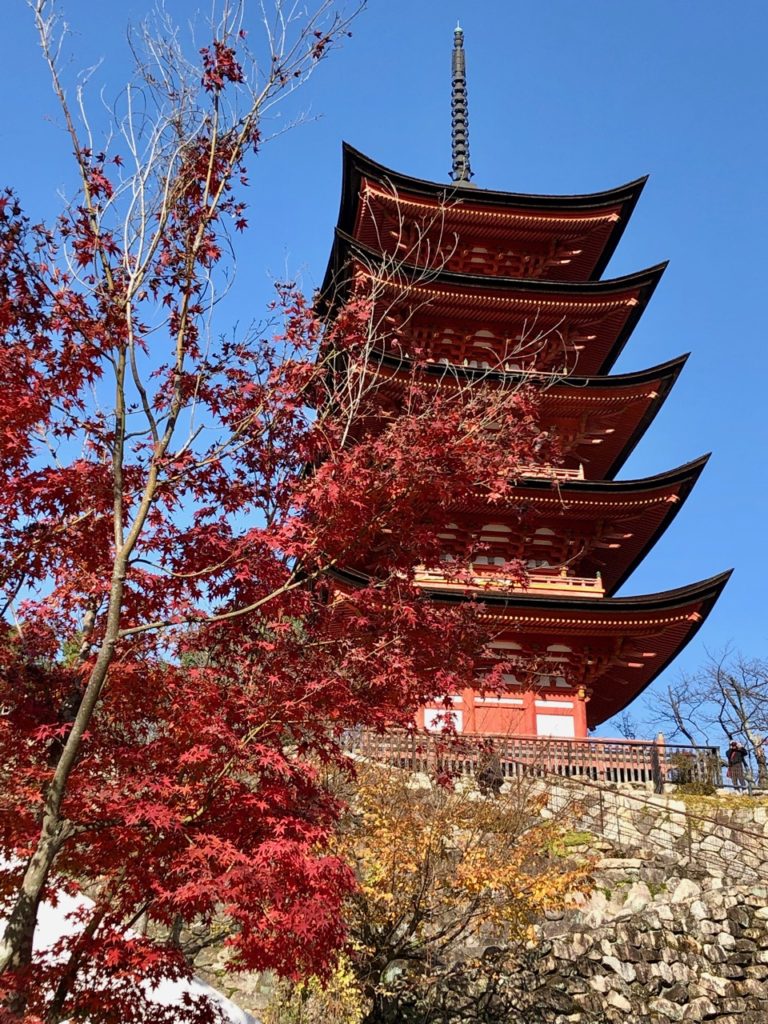
How would you describe your travel style?
M&R: I would say that we’re both pretty flexible (my husband more so than me!) as we can generally adapt to various situations. However, we both still get a bit stressed on our travel days, especially if we have to catch a flight.
While we don’t need luxury, we do need certain amenities in the places we stay. For example, we always rent a place that isn’t shared and that is generally pretty modern. This is much easier to do in SE Asia, where prices are pretty low and there tends to be a lot of recent development. We also don’t like waking up early and aren’t really able to sleep except in our bed, so wherever possible, we avoid early-morning traveling or red-eye flights, even if they’re cheaper than flying later in the day.
If you could never travel again and could pick any city to be confined to, where would you pick? And why?
M&R: Apart from Vancouver, Paris would be the city we could easily live in. We spent a month there in spring 2019 and loved it. Aesthetically, it’s just such a beautiful city and is easy to walk around and take in the architecture, admire the iconic landmarks (and there are so many!) and bridges, and picnic in one of the many parks; it feels like my version of utopia. Plus they have the BEST baguettes and desserts there. And even though Parisians get a bad reputation as being rude or snobbish, we’ve only ever experienced the opposite.
How much stuff do you travel with?
M&R: While we don’t have a lot of luggage, we do each have a small Pullman-style suitcase that unfortunately is too large to use as carry-on, in addition to a backpack, both of which are pretty full. In the past couple of years of traveling, we’ve had to pack for multiple seasons, which means while we have our summer shorts, t-shirts, and flip flops we also have to pack a puffy jacket, pants, long sleeve-tops, and shoes for cooler and wetter weather. We also bring a ton of sunblock when we’re in the tropics as we’ve found that especially in Southeast Asia, it’s expensive to buy (yup, the place where you need it the most!) AND is likely to have skin whitener in it
What’s something you pack that’s not absolutely essential but you like having it?
M&R: A chocolate supply. Even though I know I can get chocolate pretty much anywhere I go, I always bring a stash with me. Just in case..
Spending

How much money do you spend on travel per year? How many days of travel does this represent? How much does this represent per day and per person?
M&R: During a period of a little over 10 months, we spent a total of $39,610 CAD by visiting 8 countries. The details of our spending are below:
Note: costs include accommodation, food (restaurants), groceries, transportation (airfare, bus, train, motorcycle & car rental), entertainment, health insurance, cell phone plans, grooming, clothes, fitness, miscellaneous.
| Cost per day and per person | Number of Days | Total cost per location | |
| Thailand | $46.27 CAD (or $34.77 USD) | 88 | $8,143 CAD (or $6,119 USD) |
| Indonesia (Bali) | $57.50 CAD (or $43.21 USD) | 29 | $3,335 CAD (or $2,506 USD) |
| Singapore | $165.88 CAD (or $124.66 USD) | 4 | $1,327 CAD (or $997 USD) |
| Malaysia | $43.19 CAD (or $32.46 USD) | 40 | $3,455 CAD (or 2,596 USD) |
| Vietnam | $47.80 CAD (or $35.92 USD) | 48 | $4,588 CAD (or 3,448 USD) |
| Cambodia | $54.83 CAD (or $41.20 USD) | 15 | $1,999 CAD (or $1,502 USD) |
| Laos | $54.83 CAD (or $41.20 USD) | 18 | $1,974 CAD (or $1,483 USD) |
| Japan | $104.14 CA (or $78.26 USD) | 71 | $14,788 CAD (or 11,113 USD) |
| TOTAL | 313 | 39,609.00 CAD (or $29,766 USD) |
How do you fund your travel (savings/work whilst traveling/other)?
M&R: We draw from our savings account and cash out stocks as necessary. I also do a bit of work for my previous employer but it’s pretty minimal.
Community

How do you meet people when you travel? Do you have any tips for people that are having challenges meeting people while traveling?
M&R: This is actually an area that has surprised us the most as we haven’t met many others throughout our travels, something that I had expected we would. It’s due to a couple of main factors, I think. In many of the places we’ve stayed, there really hasn’t been an opportunity to interact with others. For example, we pretty much only stay at Airbnbs and if we happen to see other residents, while we might exchange a “hello”, usually there are language barriers that prevent us from engaging in a conversation. When we have met others, it has typically been when we’ve been on an organized outing, such as a boat-trip along the Douro River when I chatted with a couple from Florida. I guess when I really think about it, at home when we go about our day-to-day activities, it’s not like we really “meet” others, unless it’s something a little more organized, like through work or a team sport, for example.
Perhaps an exception to this has been a few of our Airbnb hosts; we had one amazing set of hosts in Turin who spent a couple of hours with us going over what there was to see in their city and then on a different day, they took us out for a tour of some of the sights! Another host in Rome again went over what to do and see, and how to get there, then took us out to a local restaurant for some prosecco. These kinds of experiences really made our time in both cities memorable.
Do you see this changing as you keep traveling? If so, how?
M&R: Perhaps. In the future, we might look at staying for a longer period in each city, which would allow us to build a network there. As well, learning from other’s experiences about how they’ve developed a community would help us in this area. And finally, I think making online connections, like through the Mr. Nomad Numbers, means that possibly we could meet up with other like-minded travelers when abroad!
Last but not least
16. What is one resource (blog, podcast, book besides your own) you recommend for those that want to pursue your lifestyle?
M&R: I actually don’t follow many blogs or listen to podcasts but I would say the Mr. Money Mustache is the main resource I’d suggest. He’s such an engaging writer – at least it resonates well with me – and his blog isn’t full of financial jargon, so it doesn’t put you to sleep. Plus he likes to tell it like it is and call people out for their stupidity.
17. What advice do you have for others who are considering this type of lifestyle?
M&R: Be flexible. Make sure that your planning is done together with your partner (if you have one) and that they’re on-board especially with major decisions. Think outside the box for options (yup, I know it sounds cliché). If you have a financial advisor, go over your numbers with them so that you have another set of eyes looking at your figures. And don’t plan too far ahead as this allows for more freedom to be spontaneous.
18. Tell us one belief that is held up by society as ‘common sense’ but that you disagree with and why.
M&R: That everyone should aspire to own their own home. This way of thinking worked in the past, but in some real estate markets, like Vancouver, it doesn’t make much sense any more and I feel you can be better off renting. Houses on average sell for $1.47M Canadian dollars (~$1.10M USD) in the City of Vancouver, yet salaries don’t measure up, leaving so many people heavily in debt and put in a precarious position should/when the next recession hits. On the flip side, the vacancy rate in Vancouver is also very low, sitting at 1-1.1%, so finding a place to rent can certainly present its own set of challenges.
Having said this though, we have helped fund our early retirement through real estate transactions, both in the Lower Mainland (Vancouver) and through purchasing investment properties in Arizona. But we were lucky (and we were lucky, as we certainly aren’t real estate experts) enough that we correctly timed the markets with both purchasing and selling, took some risks, and were able to come out ahead.
I’m definitely not an expert in the renting vs. buying argument though. If you visit the Millennial Revolution blog, they do an excellent job of helping readers determine if they’re better off buying or renting, as well as explaining why we should question if buying is the best available option.
Rapid Fire Questions
| What is your favorite travel destination & why? | M&R: Thailand, as it’s got so much to offer travelers: it’s inexpensive, it’s got delicious food, the people are genuine and friendly, the beaches are usually stunning (except when it’s jellyfish season and dead jellyfish the size of dinner plates litter the beach), and there’s a good mix of activities to do. |
| What was the most creative thing you’ve ever done to save money during your travels? | M&R: Hmmmm, good question. In Paris, we initially weren’t going to stay for a month but when searching Airbnb, we noticed that there was a significant discount for stays over 28 days. The place we booked was discounted 67%, which while it was still pricey, allowed us to stay a couple of blocks from the Arc de Triomphe and we were able to walk almost everywhere in the city (helping to burn off all the pain au chocolats and other delicacies we enjoyed!). |
| What was your biggest travel mistake? | M&R: Not verifying how long we could stay in Thailand with only a regular visa you receive when you enter the country (FYI: it’s 30 days for most tourists, depending on your citizenship, unless you get a special tourist visa in advance. However, it turned out that we could actually have extended our stay by going to the immigration office in the country but the information the Thai government puts out about the visa process is VERY confusing). Luckily, I had only booked an Airbnb for 30 days and so we went to Bali after instead of staying in Thailand for the 3 months I had initially planned. |
Thank you very much Marcia for sharing your story!
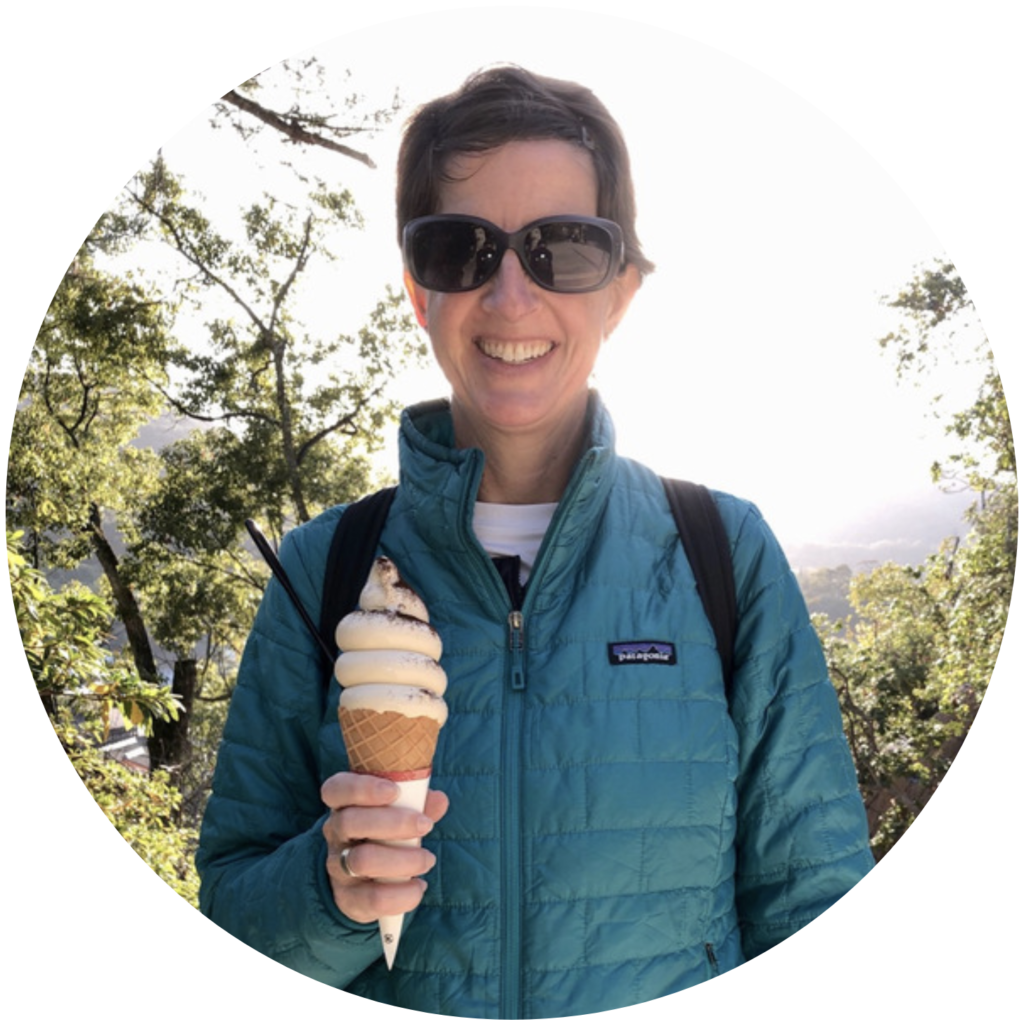
If you want to know more about Marcia & Ray, you can find them on the following platforms:
- Facebook – Marcia Shimizu
- Instagram – marcialshimizu
The Bottom Line
Here are the main lessons we took away from this interview:
- Lesson 1 – When it comes to planning this lifestyle Marcia suggests that we should be flexible – From inception to execution, this approach totally resonate to us. We were initially planning to travel for a year but then read life changing books, attended a retreat, and joined copious amounts of local meetups to meet like-minded people to learn from that totally changed our plans. We discovered that travel doesn’t have to be expensive. By adopting slow travel, we could make our money last for years. We eventually hired a financial advisor who looked at our numbers and gave us the confirmation we needed to feel confident about the unbeaten path we wanted to take. Last but not least, we routinely planned only 3 months in advance when it comes to travel and this has definitely given us a bit more flexibility when we need to make some short-term plans adjustments. So we are definitely 100% behind the “be flexible” advice from Marcia 🙂
- Lesson 2 – Common belief: “everyone should aspire to own their own home” – In the 10 years I spent in San Francisco (2008-2018), I can definitely relate to the fact that the real estate market in this city doesn’t make any sense, at least for people expecting to generate any kind of appreciation by purchasing a home. This is actually why Mrs. NN sold her condo as soon as we started looking at it from an investment perspective and we’ve been able to redirect this capital towards investment properties in states where we can get ahead of the game and generate a nice return on investment for a fraction of the cost to buy a home. This belief actually fit into the same category of beliefs than the one that said that “people need to work until they reach the traditional retirement age”. Instead, people should focus on working until they save 25X of their annual expenses.
- Lesson 3 – “We noticed that [using AirBnB] there was a significant discount for stays over 28 days. The place we booked for a month in Paris was discounted 67%” – For people on a nomadic journey, AirBnB is definitely a very solid platform to use as they offer significant discounts as soon as people book for long-term stays (which are stays of 4+ weeks). If you are interested to know more about getting great deals using AirBnB, check out our ultimate guide to save money using AirBnB!
Call to action
What do you think about this story? We would love to hear from you, so feel free to share your feedback by leaving a comment below.
Sometimes we need to hear about others making unconventional decisions before we can have the confidence to make our own. If you have(or are on a path to) an unconventional journey to improve your life that has a travel component to it and are interested to share it, please reach out to us as we would love to feature your story.
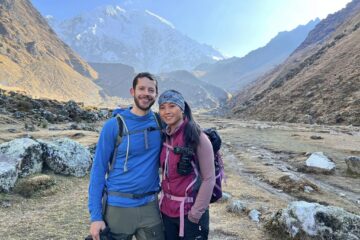
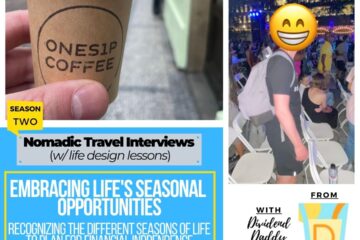
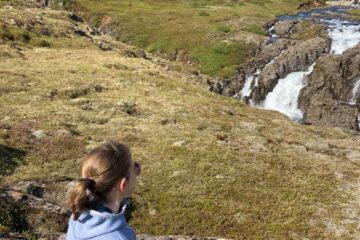
1 Comment
What we learned from interviewing nomadic travelers - Nomad Numbers · May 19, 2020 at 12:02 pm
[…] “That everyone should aspire to own their own home.” – Marcia & Ray […]